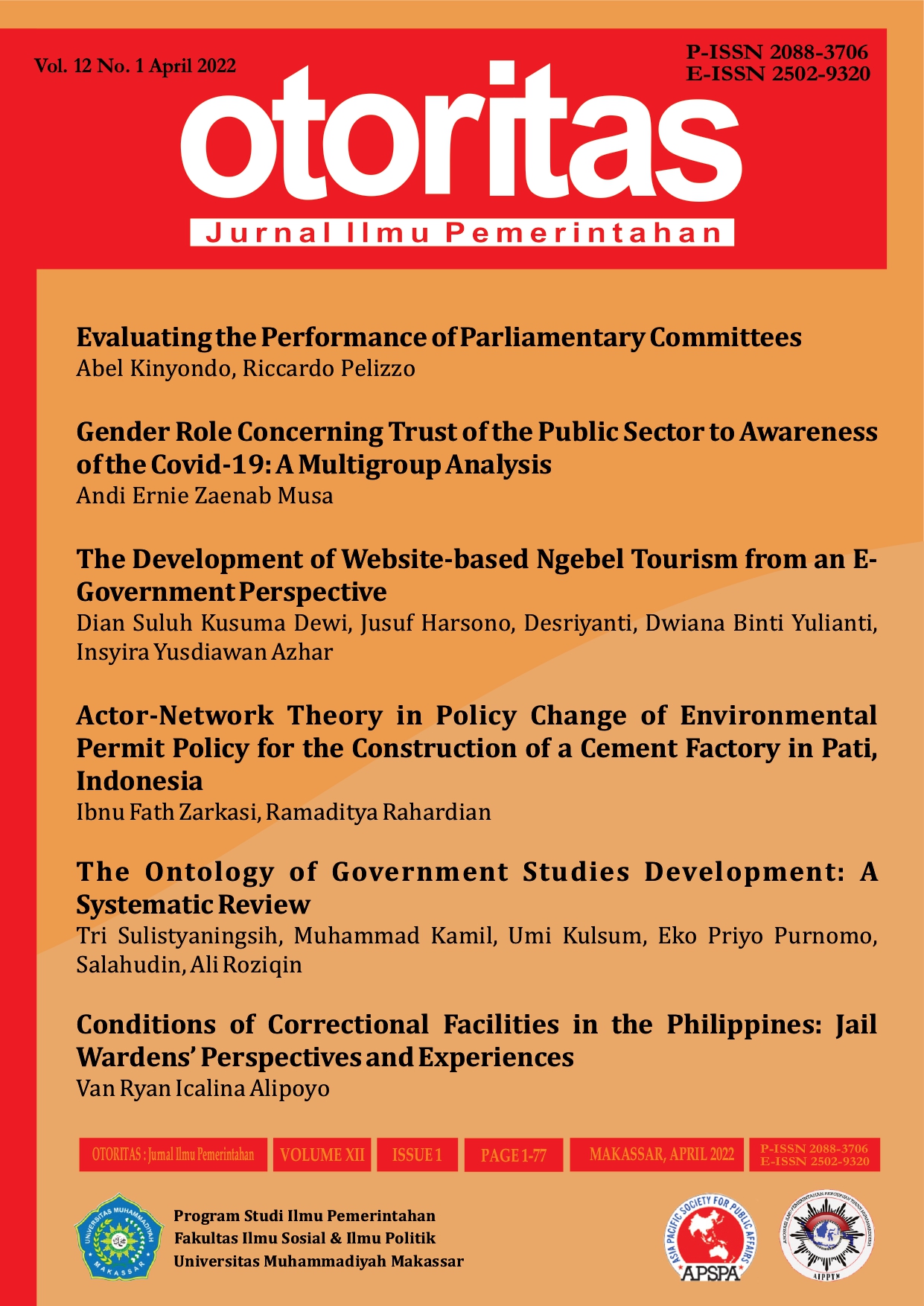Evaluating the Performance of Parliamentary Committees
DOI:
https://doi.org/10.26618/ojip.v12i1.7319Keywords:
Committees, Parliaments, Performances, Economy, Effectiveness, EfficiencyAbstract
Assessing parliamentary committees’ performance is important as it can ensure good governance. This has prompted various scholars and practitioners to devise several evaluation methods over the past two decades. Some of the methods include measuring the number of important bills that committees pass, measuring the number of important issues that committees address and measuring the number of unimportant bills, which committees block. While all these methods are important in advancing the knowledge of assessing committees’ performance, they are not very useful to parliamentary actors such as parliamentarians as they lack the sense of contemporaneousness in their measurements. It is in this context that using documentary review and data from reliable sources such as World Governance Indicators, this paper innovatively presents a rule of thumb proposing that parliamentary committees’ performance should instantaneously, be measured by the extent to which actions of a particular committee are consistent with three E’s namely, economy, effectiveness and efficiency.
References
Binder, S. A. (1999). The dynamics of legislative gridlock, 1947–96. American Political Science Review, 93(3), 519–533.
Capano, G., & Giuliani, M. (2003). The Italian parliament: In search of a new role? The Journal of Legislative Studies, 9(2), 8–34. https://doi.org/10.1080/1357233032000250617
Coghill, K., Holland, P., Kinyondo, A., Lewis, C., & Steinack, K. (2012). The functions of Parliament: reality challenges tradition. Australasian Parliamentary Review, 27(2), 55–70.
Coghill, K., & Kinyondo, A. (2015). Benchmarks for codes of conduct. Parliamentarian, 1(1), 172–175.
Connolly, W. E. (1993). The terms of political discourse. New Jersey: Princeton University Press.
Döring, H. (1995). Parliaments and majority rule in Western Europe. London: Palgrave Macmillan.
Friedman, M. (1953). Essays in positive economics. Chicago: University of Chicago Press.
Johnson, J. K. (2005). The role of parliament in government. Washington D.C.: World Bank Institute.
Kinyondo, A. (2012). Return on Training Investment in Parliaments: The Need for Change in the Pacific Region. Parliamentary Affairs, 65(3), 576–592. https://doi.org/10.1093/pa/gss029
Kinyondo, A. (2013). Strengthening parliaments in nascent democracies: The Need to prioritise reforms. Australasian Parliamentary Review, 28(1).
Kinyondo, A., & Pelizzo, R. (2013). Strengthening Legislatures: Some Lessons from the Pacific Region. Politics & Policy, 41(3), 420–446. https://doi.org/10.1111/polp.12020
Loewenberg, G., & Patterson, S. C. (1988). Comparing Legislatures. Maryland: University Press Of America.
Mayhew, D. R. (2005). Divided we govern: Party control, lawmaking and investigations, 1946-2002. London: Yale university press.
Nunnari, S. (2021). Dynamic legislative bargaining with veto power: Theory and experiments. Games and Economic Behavior, 126, 186–230. https://doi.org/10.1016/j.geb.2020.11.006
Olson, D. M. (2015). Democratic Legislative Institutions: A Comparative View. New York: Routledge. https://doi.org/10.4324/9781315705200
Pasquino, G., & Pelizzo, R. (2006). Parlamenti Democratici. Bologna: il Mulino.
Pelizzo, R. (2018). The determinants of Party System Change in Sub-Saharan Africa. Otoritas : Jurnal Ilmu Pemerintahan, 8(2), 124–129. https://doi.org/10.26618/ojip.v8i2.1161
Pelizzo, R., & Kinyondo, A. (2014). Public Accounts Committees in Eastern and Southern Africa: A Comparative Analysis. Politics & Policy, 42(1), 77–102.
Pelizzo, R., & Stapenhurst, F. (2004). Legislatures and Oversight: A Note. Quaderni Di Scienza Politica, 11(1), 175–188.
Pelizzo, R., & Stapenhurst, F. (2013). Parliamentary Oversight Tools. London: Routledge. https://doi.org/10.4324/9780203151228
Rockman, B. A. (1984). Legislative-executive relations and legislative oversight. Legislative Studies Quarterly, 387–440.
Sartori, G. (2016). Elementi di teoria politica. Bologna: Il Mulino.
Sinclair, B. (2016). Unorthodox lawmaking: New legislative processes in the US Congress. Washington D.C.: CQ Press.
Tsebelis, G. (2022). Constitutional Rigidity Matters: A Veto Players Approach. British Journal of Political Science, 52(1), 280–299. https://doi.org/10.1017/S0007123420000411
Wiberg, M. (1995). Parliamentary Questioning: Control by Communication. In H. Doring (Ed.), Parliaments and Majority Rule in Western Europe (pp. 179–222). London: Palgrave Macmillan.
World Governance Indicators (Various). World Bank Data Bank. Washington: The World Bank.
Downloads
Published
Issue
Section
License
The Editorial Team of Otoritas: Jurnal Ilmu Pemerintahan reserves the right to transfer the copyright of the article once it has been accepted and a decision has been made to publish it.
Department of Government Studies, Faculty of Social and Political Sciences, Universitas Muhammadiyah Makassar in collaboration with Muhammadiyah’s College Association of Government Studies (AIPPTM) and Asia Pacific Society for Public Affairs (APSPA) as the publisher of Otoritas: Jurnal Ilmu Pemerintahan holds the copyright of all articles published in this journal.
The Publisher holds the right to reproduce and distribute the article and author is not allowed to publish the same article published in this journal.
Statement of Authenticity and Manuscript Copyright can be downloaded: here
After filling in the statement letter, please send via e-mail: otoritas@unismuh.ac.id






